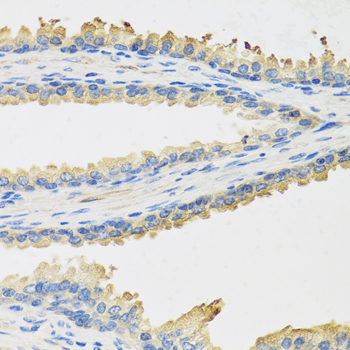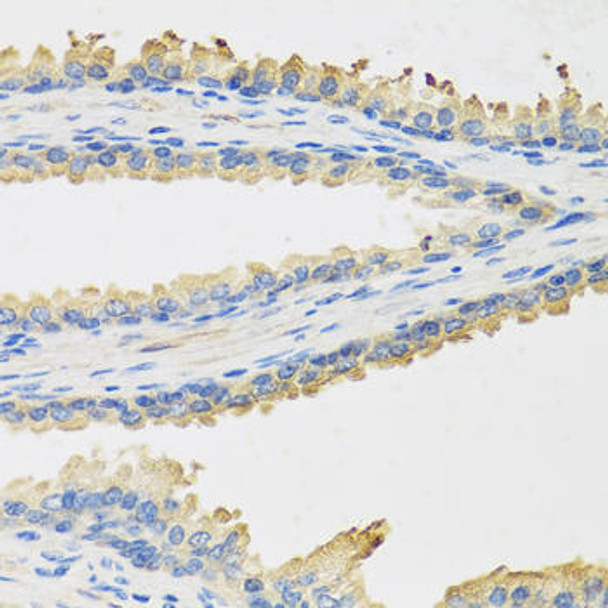Anti-LEP Antibody (CAB5673)
- SKU:
- CAB5673
- Product type:
- Antibody
- Reactivity:
- Human
- Host Species:
- Rabbit
- Isotype:
- IgG
- Antibody Type:
- Polyclonal Antibody
- Research Area:
- Cell Biology
Description
| 抗体名: | Anti-LEP Antibody |
| 抗体コード: | CAB5673 |
| 抗体サイズ: | 20uL, 50uL, 100uL |
| 申し込み: | IHC |
| 反応性: | Human |
| 宿主種: | Rabbit |
| 免疫原: | Recombinant fusion protein containing a sequence corresponding to amino acids 22-167 of human LEP (NP_000221.1). |
| 申し込み: | IHC |
| 推奨希釈: | IHC 1:50 - 1:200 |
| 反応性: | Human |
| ポジティブサンプル: |
| 免疫原: | Recombinant fusion protein containing a sequence corresponding to amino acids 22-167 of human LEP (NP_000221.1). |
| 精製方法: | Affinity purification |
| ストレージバッファ: | Store at -20'C. Avoid freeze / thaw cycles. Buffer: PBS with 0.02% sodium azide, 50% glycerol, pH7.3. |
| アイソタイプ: | IgG |
| 順序: | VPIQ KVQD DTKT LIKT IVTR INDI SHTQ SVSS KQKV TGLD FIPG LHPI LTLS KMDQ TLAV YQQI LTSM PSRN VIQI SNDL ENLR DLLH VLAF SKSC HLPW ASGL ETLD SLGG VLEA SGYS TEVV ALSR LQGS LQDM LWQL DLSP GC |
| 遺伝子ID: | 3952 |
| Uniprot: | P41159 |
| セルラーロケーション: | Secreted |
| 計算された分子量: | 18kDa |
| 観察された分子量: |
| 同義語: | LEP, LEPD, OB, OBS, leptin |
| バックグラウンド: | This gene encodes a protein that is secreted by white adipocytes, and which plays a major role in the regulation of body weight. This protein, which acts through the leptin receptor, functions as part of a signaling pathway that can inhibit food intake and/or regulate energy expenditure to maintain constancy of the adipose mass. This protein also has several endocrine functions, and is involved in the regulation of immune and inflammatory responses, hematopoiesis, angiogenesis and wound healing. Mutations in this gene and/or its regulatory regions cause severe obesity, and morbid obesity with hypogonadism. This gene has also been linked to type 2 diabetes mellitus development. |
| UniProt Protein Function: | leptin: May function as part of a signaling pathway that acts to regulate the size of the body fat depot. An increase in the level of LEP may act directly or indirectly on the CNS to inhibit food intake and/or regulate energy expenditure as part of a homeostatic mechanism to maintain constancy of the adipose mass. Defects in LEP may be a cause of obesity (OBESITY). It is a condition characterized by an increase of body weight beyond the limitation of skeletal and physical requirements, as the result of excessive accumulation of body fat. Belongs to the leptin family. |
| UniProt Protein Details: | Protein type:Secreted; Secreted, signal peptide; Hormone; Cell development/differentiation Chromosomal Location of Human Ortholog: 7q31.3 Cellular Component: extracellular space; cytoplasm; extracellular region Molecular Function:peptide hormone receptor binding; growth factor activity; hormone activity Biological Process: circadian rhythm; response to dietary excess; positive regulation of myeloid cell differentiation; regulation of fat cell differentiation; regulation of steroid biosynthetic process; female pregnancy; negative regulation of transcription from RNA polymerase II promoter; glucose homeostasis; positive regulation of luteinizing hormone secretion; negative regulation of appetite; positive regulation of tyrosine phosphorylation of Stat3 protein; response to insulin stimulus; response to vitamin E; positive regulation of MAPKKK cascade; regulation of cholesterol absorption; regulation of blood pressure; positive regulation of cell proliferation; positive regulation of ion transport; central nervous system neuron development; placenta development; positive regulation of cytokine production; cholesterol metabolic process; positive regulation of developmental growth; bile acid metabolic process; eating behavior; glucose metabolic process; adult feeding behavior; ovulation from ovarian follicle; leptin-mediated signaling pathway; negative regulation of vasoconstriction; tyrosine phosphorylation of STAT protein; fatty acid beta-oxidation; insulin secretion; glycerol biosynthetic process; energy reserve metabolic process; response to hypoxia; hormone metabolic process; regulation of gluconeogenesis; positive regulation of follicle-stimulating hormone secretion; positive regulation of insulin receptor signaling pathway; leukocyte tethering or rolling; regulation of insulin secretion; negative regulation of apoptosis Disease: Leptin Deficiency |
| NCBI Summary: | This gene encodes a protein that is secreted by white adipocytes, and which plays a major role in the regulation of body weight. This protein, which acts through the leptin receptor, functions as part of a signaling pathway that can inhibit food intake and/or regulate energy expenditure to maintain constancy of the adipose mass. This protein also has several endocrine functions, and is involved in the regulation of immune and inflammatory responses, hematopoiesis, angiogenesis and wound healing. Mutations in this gene and/or its regulatory regions cause severe obesity, and morbid obesity with hypogonadism. This gene has also been linked to type 2 diabetes mellitus development. [provided by RefSeq, Jul 2008] |
| UniProt Code: | P41159 |
| NCBI GenInfo Identifier: | 730218 |
| NCBI Gene ID: | 3952 |
| NCBI Accession: | P41159.1 |
| UniProt Secondary Accession: | P41159,O15158, Q56A88, |
| UniProt Related Accession: | P41159 |
| Molecular Weight: | 18,641 Da |
| NCBI Full Name: | Leptin |
| NCBI Synonym Full Names: | leptin |
| NCBI Official Symbol: | LEP |
| NCBI Official Synonym Symbols: | OB; OBS; LEPD |
| NCBI Protein Information: | leptin; obese protein; obesity factor; obese, mouse, homolog of; leptin (murine obesity homolog); leptin (obesity homolog, mouse) |
| UniProt Protein Name: | Leptin |
| UniProt Synonym Protein Names: | Obese protein; Obesity factor |
| Protein Family: | Leptin |
| UniProt Gene Name: | LEP |
| UniProt Entry Name: | LEP_HUMAN |
 | Immunohistochemistry of paraffin-embedded human prostate using LEP antibody (CAB5673) at dilution of 1:100 (40x lens). |

